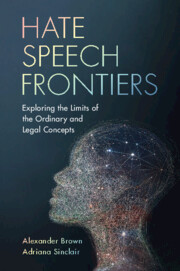Book contents
- Hate Speech Frontiers
- Hate Speech Frontiers
- Copyright page
- Dedication
- Contents
- Acknowledgements
- 1 Conceptual Frontiers in the Understanding of Hate Speech
- Part I The Ordinary Concept
- 2 Prototypical Examples of Hate Speech
- 3 Attacks against Groups
- 4 Attacks on the Identities of Groups
- Part II The Legal Concept
- Notes
- Index
3 - Attacks against Groups
from Part I - The Ordinary Concept
Published online by Cambridge University Press: 26 October 2023
- Hate Speech Frontiers
- Hate Speech Frontiers
- Copyright page
- Dedication
- Contents
- Acknowledgements
- 1 Conceptual Frontiers in the Understanding of Hate Speech
- Part I The Ordinary Concept
- 2 Prototypical Examples of Hate Speech
- 3 Attacks against Groups
- 4 Attacks on the Identities of Groups
- Part II The Legal Concept
- Notes
- Index
Summary
Chapter 3 makes the case for classifying five grey area examples as hate speech in the ordinary sense of the term based on the global resemblance test. We also argue that Facebook’s community standard on hate speech is ambiguous, inconsistent, and incomplete in relation to these examples, and so recommend specific reforms. Section 3.2 looks at hybrid attacks, which, like personal insults, target specific individuals, but, like prototypical hate speech, also attack the groups to which targeted individuals belong and, go beyond standard protected characteristics. Section 3.3 investigates selective attacks, which are derogatory or insulting words that refer to only a subset of a group or else to an amalgamated set of people who belong to multiple groups. Section 3.4 scrutinises reverse attacks, which involve words used by members of groups typically perceived as victims against groups more usually considered perpetrators. Section 3.5 examines righteous attacks, which we associate with attacks in pursuit of some righteous cause. Finally, Section 3.6 assesses indirect attacks, wherein the speaker intentionally uses a derogatory word to address or target someone whom the speaker knows or presumes to be not a member of the group referred to by the word under its literal or primary meaning.
Keywords
- Type
- Chapter
- Information
- Hate Speech FrontiersExploring the Limits of the Ordinary and Legal Concepts, pp. 88 - 208Publisher: Cambridge University PressPrint publication year: 2023



